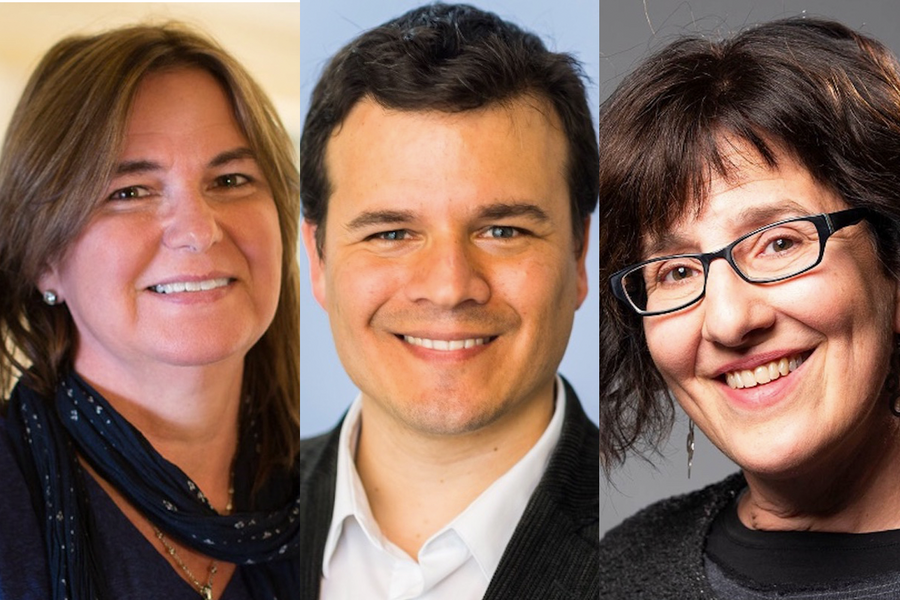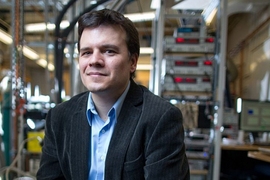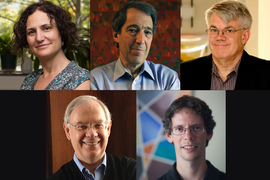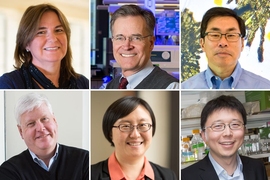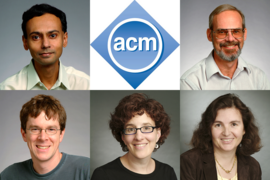The National Academy of Sciences has elected 120 new members and 30 international associates, including three MIT professors — Angela Belcher, Pablo Jarillo-Herrero, and Ronitt Rubinfeld — in recognition of their achievements in original research.
Angela Belcher is the James Mason Crafts Professor of Biological Engineering and Materials Science, a member of the Koch Institute for Integrative Cancer Research at MIT, and the head of the Department of Biological Engineering.
She is a biological and materials engineer with expertise in the fields of biomaterials, biomolecular materials, organic-inorganic interfaces, and solid-state chemistry and devices. Her primary research focus is evolving new materials for energy, electronics, the environment, and medicine.
She received her BS in creative studies from the University of California at Santa Barbara. She earned a PhD in inorganic chemistry at UCSB in 1997. Following her postdoctoral research in electrical engineering at UCSB, she joined the faculty at the University of Texas at Austin in the Department of Chemistry. She joined the faculty at MIT in 2002.
Recognitions include the 2013 $500,000 Lemelson-MIT Prize; the 2010 Eni Prize for Renewable and Non-conventional Energy; and being named a 2018 National Academy of Engineers Fellow, 2015 National Academy of Inventors Fellow, and 2012 American Academy of Arts and Sciences Fellow. In 2009, Rolling Stone magazine listed her as one of the top 100 people changing the country. She has founded five companies, and also holds 36 patents, with many pending. In 2019, she began her tenure as head of the Department of Biological Engineering.
Pablo Jarillo-Herrero, the Cecil and Ida Green Professor of Physics, investigates the quantum electronic transport and optoelectronics properties of novel two-dimensional materials, with special emphasis to their superconducting, magnetic, and topological properties. He is known for his groundbreaking research on twistronics — in 2018, the Jarillo-Herrero group discovered that by rotating two layers of graphene by a “magic angle,” the bilayer material can be turned from a metal into an electrical insulator or even a superconductor.
A native of Spain, Jarillo-Herrero received his “licenciatura” in physics from the University of Valencia, an MSc degree from the University of California at San Diego, and his PhD in 2005 from the Delft University of Technology in the Netherlands. After a one-year postdoc in Delft, he worked at Columbia University as a NanoResearch Initiative Fellow before joining MIT in 2008.
His early career awards include an NSF Career Award (2008), a David and Lucile Packard Fellowship (2009), a DOE Early Career Award (2011), a Presidential Early Career Award for Scientists and Engineers (PECASE, 2012), an ONR Young Investigator Award (2013), and a Moore Foundation Experimental Physics in Quantum Systems Investigator Award (2014 and 2019). He has been selected as a Highly Cited Researcher by Clarivate Analytics-Web of Science (2017-present), and was elected APS Fellow in 2018. Jarillo-Herrero is the recipient of the APS 2020 Oliver E. Buckley Condensed Matter Physics Prize, the 2020 Wolf Prize in Physics, the 2020 Medal of the Spanish Royal Physics Society, the 2021 Lise Meitner Distinguished Lecture and Medal, the 2021 U.S. National Academy of Sciences Award for Scientific Discovery, and the 2022 Dan Maydan Prize in Nanoscience Research.
Ronitt Rubinfeld is the Edwin Sibley Webster Professor in the Department of Electrical Engineering and Computer Science (EECS), and a member of the Computer Science and Artificial Intelligence Laboratory’s Theory of Computation group. Her research interests include randomized and sublinear time algorithms, with a particular focus on what can be understood about data by looking at only a very small portion of it.
Ronitt received her PhD from the University of California at Berkeley in 1991, and prior to that graduated from the University of Michigan with a BSE in electrical and computer engineering. Before coming to MIT, Ronitt held postdoc positions at Princeton University and Hebrew University. In 1992, she joined the faculty of the Computer Science Department at Cornell University, where she was an ONR Young Investigator, a Sloan Research Fellow, the 1995 Cornell Association for Computer Science Undergraduates Faculty of the Year, and a recipient of the Cornell College of Engineering Teaching Award. From 1999 to 2003, Ronitt was a senior research scientist at NEC Research Laboratories, and in 2004, she was a fellow at the Radcliffe Institute for Advanced Study.
Among other honors, Rubinfeld gave an invited lecture at the International Congress of Mathematicians in 2006. She has been recognized by MIT with the Capers and Marion McDonald Award for Excellence in Mentoring and Advising in 2018, and the Seth J. Teller Award for Excellence, Inclusion, and Diversity in 2019. She became a fellow of the Association for Computing Machinery in 2014 for contributions to delegated computation, sublinear time algorithms, and property testing; and she was elected a fellow of the American Academy of Arts and Sciences in 2020.
Those elected this year bring the total number of active members to 2,512 and the total number of international members to 517. The National Academy of Sciences is a private, nonprofit institution that was established under a congressional charter signed by President Abraham Lincoln in 1863. It recognizes achievement in science by election to membership, and — with the National Academy of Engineering and the National Academy of Medicine — provides science, engineering, and health policy advice to the federal government and other organizations.
